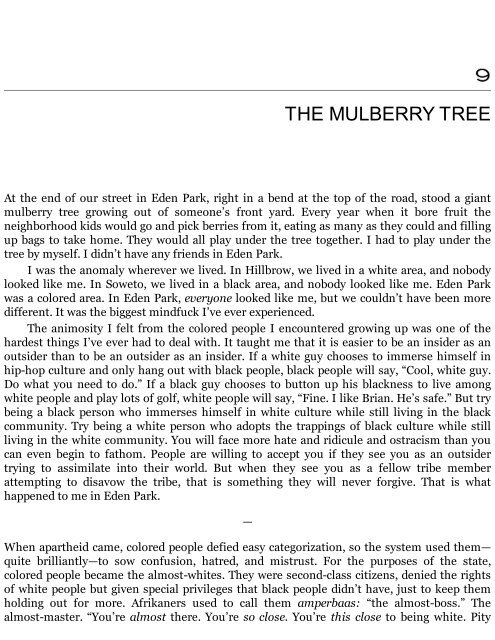Create successful ePaper yourself
Turn your PDF publications into a flip-book with our unique Google optimized e-Paper software.
THE MULBERRY TREE<br />
At the end of our street in Eden Park, right in a bend at the top of the road, stood a giant<br />
mulberry tree growing out of someone’s front yard. Every year when it bore fruit the<br />
neighborhood kids would go and pick berries from it, eating as many as they could and filling<br />
up bags to take home. They would all play under the tree together. I had to play under the<br />
tree by myself. I didn’t have any friends in Eden Park.<br />
I was the anomaly wherever we lived. In Hillbrow, we lived in a white area, and nobody<br />
looked like me. In Soweto, we lived in a black area, and nobody looked like me. Eden Park<br />
was a colored area. In Eden Park, everyone looked like me, but we couldn’t have been more<br />
different. It was the biggest mindfuck I’ve ever experienced.<br />
The animosity I felt from the colored people I encountered growing up was one of the<br />
hardest things I’ve ever had to deal with. It taught me that it is easier to be an insider as an<br />
outsider than to be an outsider as an insider. If a white guy chooses to immerse himself in<br />
hip-hop culture and only hang out with black people, black people will say, “Cool, white guy.<br />
Do what you need to do.” If a black guy chooses to button up his blackness to live among<br />
white people and play lots of golf, white people will say, “Fine. I like Brian. He’s safe.” But try<br />
being a black person who immerses himself in white culture while still living in the black<br />
community. Try being a white person who adopts the trappings of black culture while still<br />
living in the white community. You will face more hate and ridicule and ostracism than you<br />
can even begin to fathom. People are willing to accept you if they see you as an outsider<br />
trying to assimilate into their world. But when they see you as a fellow tribe member<br />
attempting to disavow the tribe, that is something they will never forgive. That is what<br />
happened to me in Eden Park.<br />
—<br />
When apartheid came, colored people defied easy categorization, so the system used them—<br />
quite brilliantly—to sow confusion, hatred, and mistrust. For the purposes of the state,<br />
colored people became the almost-whites. They were second-class citizens, denied the rights<br />
of white people but given special privileges that black people didn’t have, just to keep them<br />
holding out for more. Afrikaners used to call them amperbaas: “the almost-boss.” The<br />
almost-master. “You’re almost there. You’re so close. You’re this close to being white. Pity
















